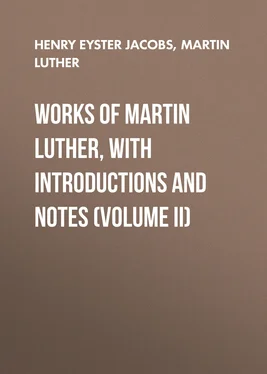Henry Eyster Jacobs - Works of Martin Luther, with Introductions and Notes (Volume II)
Здесь есть возможность читать онлайн «Henry Eyster Jacobs - Works of Martin Luther, with Introductions and Notes (Volume II)» — ознакомительный отрывок электронной книги совершенно бесплатно, а после прочтения отрывка купить полную версию. В некоторых случаях можно слушать аудио, скачать через торрент в формате fb2 и присутствует краткое содержание. Жанр: foreign_prose, foreign_religion, Философия, foreign_psychology, foreign_antique, на немецком языке. Описание произведения, (предисловие) а так же отзывы посетителей доступны на портале библиотеки ЛибКат.
- Название:Works of Martin Luther, with Introductions and Notes (Volume II)
- Автор:
- Жанр:
- Год:неизвестен
- ISBN:нет данных
- Рейтинг книги:3 / 5. Голосов: 1
-
Избранное:Добавить в избранное
- Отзывы:
-
Ваша оценка:
- 60
- 1
- 2
- 3
- 4
- 5
Works of Martin Luther, with Introductions and Notes (Volume II): краткое содержание, описание и аннотация
Предлагаем к чтению аннотацию, описание, краткое содержание или предисловие (зависит от того, что написал сам автор книги «Works of Martin Luther, with Introductions and Notes (Volume II)»). Если вы не нашли необходимую информацию о книге — напишите в комментариях, мы постараемся отыскать её.
Works of Martin Luther, with Introductions and Notes (Volume II) — читать онлайн ознакомительный отрывок
Ниже представлен текст книги, разбитый по страницам. Система сохранения места последней прочитанной страницы, позволяет с удобством читать онлайн бесплатно книгу «Works of Martin Luther, with Introductions and Notes (Volume II)», без необходимости каждый раз заново искать на чём Вы остановились. Поставьте закладку, и сможете в любой момент перейти на страницу, на которой закончили чтение.
Интервал:
Закладка:
Although the canonising of saints may have been good in olden times, it is not good now; just as many other things were good in olden times and are now scandalous and injurious, such as feast-days, church-treasures and church-adornment. For it is evident that through the canonising of saints neither God's glory nor the improvement of Christians is sought, but only money and glory, in that one church wants to be something more and have something more than others, and would be sorry if another had the same thing and its advantage were common property. So entirely, in these last, evil days, have spiritual goods been misused and applied to the gaining of temporal goods, that everything, even God Himself, has been forced into the service of avarice. And even these special advantages lead only to dissensions, divisions and pride, in that the churches, differing from one another, hold each other in contempt, and exalt themselves one above another, though all the gifts which God bestows are the common and equal property of all churches and should only serve the cause of unity. The pope, too, is glad or the present state of affairs; he would be sorry if all Christians were equal and were at one.
[Sidenote: Prohibition of Special Privileges]
This is the place to speak of the church licenses, bulls and other things which the pope sells at his laying-place in Rome. We should either abolish them or disregard them, or at least make them the common property of all churches. For if he sells or gives away licenses and privileges, indulgences, graces, advantages, faculties 303 303 Indulta , i. e., grants of special privilege.
to Wittenberg, to Halle, to Venice and, above, all to his own Rome, why does he not give these things to all churches alike? Is he not bound to do for all Christians, gratis and for God's sake, everything that he can, and even to shed his blood for them? Tell me, then, why he gives or sells to one church and not to another? Or must the accursed money make, in the eyes of His Holiness, so great a difference among Christians, who all have the same baptism, Word, faith, Christ, God and all things? [Eph. 4:4 f.] Are we to be blind while we have eyes to see, fools while we have our reason, that they expect us to worship such greed, knavery and humbug? He is a shepherd,—yes, so long as you have money, and no longer! And yet they are not ashamed of their knavery, leading us hither and yon with their bulls! Their one concern is the accursed money, and nothing else!
My advice is this: If such fool's-work cannot be abolished, then every pious Christian man should open his eyes, and not be misled by the hypocritical Roman bulls and seals, stay at home in his own church and be content with his baptism, his Gospel, his faith, his Christ and with God, Who is everywhere the same; and let the pope remain a blind leader of the blind. Neither angel nor pope can give you as much as God gives you in your parish-church. Nay, the pope leads you away from the gifts of God, which you have without pay, to his gifts, which you must buy; and he gives you lead 304 304 "Lead," the leaden seal attached to the bull; "hide", the parchment on which it is written; "the string," the ribbon or silken cord from which the seals depend; "wax," the seal holding the cord to the parchment.
for gold, hide for meat, the string for the purse, wax for honey, words for goods, the letter for the spirit. You see this before your very eyes, but you are unwilling to notice it. If you are to ride to heaven on his wax and parchment, your chariot will soon go to pieces, and you will fall into hell, not in God's name!
Let this be your fixed rule: What you must buy from the pope is neither good nor of God; for what is from God, to wit, the Gospel and the works of God, is not only given without money, but the whole world is punished and damned because it has not been willing to receive it as a free gift. We have deserved of God that we should be so deceived, because we have despised His holy Word and the grace of baptism, as St. Paul says: "God shall send a strong delusion upon all those who have not received the truth to their salvation, to the end that they may believe and follow after lies and knavery," [2 Thess. 2:11 f.] which serves them right.
[Sidenote: Mendicancy to be Prohibited, and the Poor to be Cared for]
21. One of our greatest necessities is the abolition of all begging throughout Christendom. Among Christians no one ought to go begging! It would also be easy to make a law, if only we had the courage and the serious intention, to the effect that every city should provide for its own poor, and admit no foreign beggars by whatever name they might be called, whether pilgrims or mendicant monks. Every city could support its own poor, and if it were too small, the people in the surrounding villages also should be exhorted to contribute, since in any case they have to feed so many vagabonds and knaves in the guise of mendicants. In this way, too, it could be known who were really poor and who not.
There would have to be an overseer or warden who knew all the poor and informed the city council or the priests what they needed; or some other better arrangement might be made. In my judgment there is no other business in which so much knavery and deceit are practised as in begging, and yet it could all be easily abolished. Moreover, this free and universal begging hurts the common people. I have considered that each of the five or six mendicant orders 305 305 Franciscans, Dominicans, Augustinians, Carmelites and Servites.
Конец ознакомительного фрагмента.
Текст предоставлен ООО «ЛитРес».
Прочитайте эту книгу целиком, купив полную легальную версию на ЛитРес.
Безопасно оплатить книгу можно банковской картой Visa, MasterCard, Maestro, со счета мобильного телефона, с платежного терминала, в салоне МТС или Связной, через PayPal, WebMoney, Яндекс.Деньги, QIWI Кошелек, бонусными картами или другим удобным Вам способом.
1
See Clemen, 1, p. 175.
2
Enders, II, no. 254. Smith, Luther's Correspondence , I, no. 206.
3
Gess, Akten und Briefe zur Kirchenpolitik Herzog Georgs von Sachsen , Leipzig, 1905.
4
See below, p. 9.
5
In this edition, Vol. I, pp. 294-336. See especially pp. 312 ff.
6
See below, pp. 19, 25.
7
Treatise on the New Testament , Vol. I, pp. 297 ff.
8
See Köstlin, Luther's Theologie , I, 292 f.; also Hering, Die Mystik Luthers , Leipzig, 1879, pp. 171-174.
9
See below, p. 23.
10
See below, p.20.
11
See Treatise concerning the Ban , below, p. 37.
12
See Treatise on Baptism , Vol. I, pp. 56 ff.
13
Note the advance in The Babylonian Captivity , below, pp. 178 ff.
14
Cf. Babylonian Captivity , below, p. 186.
15
Cf. Sermo , 112, cap. 5 (Migne, xxxviii, 615).
16
Интервал:
Закладка:
Похожие книги на «Works of Martin Luther, with Introductions and Notes (Volume II)»
Представляем Вашему вниманию похожие книги на «Works of Martin Luther, with Introductions and Notes (Volume II)» списком для выбора. Мы отобрали схожую по названию и смыслу литературу в надежде предоставить читателям больше вариантов отыскать новые, интересные, ещё непрочитанные произведения.
Обсуждение, отзывы о книге «Works of Martin Luther, with Introductions and Notes (Volume II)» и просто собственные мнения читателей. Оставьте ваши комментарии, напишите, что Вы думаете о произведении, его смысле или главных героях. Укажите что конкретно понравилось, а что нет, и почему Вы так считаете.












